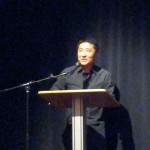WIT Life #264: Campaign
WIT Life is a periodic series written by professional Writer/Interpreter/Translator Stacy Smith (Kumamoto-ken CIR, 2000-03). She starts her day by watching Fujisankei’s newscast in Japanese, and here she shares some of the interesting tidbits and trends along with her own observations.
Yesterday I went to see director Kazuhiro Soda’s documentary Campaign (選挙) at Japan Society, being shown as part of Richie’s Electric Eight: The Bold and the Daring (part 2 of the film series honoring Ritchie that I talked about in a recent post). It came out in 2007 and was screened at the Berlin Film Festival that year, and was loved by Ritchie who introduced it at a preview at Tokyo’s Foreign Correspondents Club of Japan. This fascinating, self-funded film follows Soda’s Tokyo University (東大) classmate Kazuhiko Yamauchi in becoming the LDP candidate in a by-election for a seat on the Kawasaki City Council, after relocating there from Tokyo for that purpose. Campaign tells the story of how Yamauchi is groomed as a promising newcomer for this well-established conservative party. The LDP is killing it with Prime Minister Junichiro Koizumi and his reform platform on the national level, but engaged in a close battle with the DPJ on the local level.
Yamauchi’s education extends to his wife Sayuri, a particularly interesting character in the film. He is instructed to refer to her as his “housewife” (「家内」 or kanai) as opposed to “wife” (「妻」 or tsuma), a term they both take umbrage against but become resigned to using. In addition, Yamauchi’s supporters within the LDP’s well oiled local political machine later encourages her to quit her job to focus on her husband’s political career, an idea that outraged her. Yamauchi urges her to yes them to death without committing to anything, but she is enraged that they would even ask her to do such a thing when he hasn’t even won the election yet.
Sayuri is the s table breadwinner as Yamauchi is a self-employed coin and stamp collector, and in the Q&A following the film Soda provided some more insight into his unique subject. Yamauchi had met his wife on the Internet, not a common thing in Japan, and they honeymooned in North Korea. Prior to the election, which Yamauchi wins by a narrow margin, he had no political background and in fact had never once voted for the LDP. Though he went to Japan’s most prestigious national university, Yamauchi was a different year than Soda as he had failed the entrance exam five times. However, just having the 東大 seal of approval was enough to make him a viable candidate for the LDP to back (though he is eventually abandoned by the party due to ideological differences, and become a house husband when he and his wife have a child).
table breadwinner as Yamauchi is a self-employed coin and stamp collector, and in the Q&A following the film Soda provided some more insight into his unique subject. Yamauchi had met his wife on the Internet, not a common thing in Japan, and they honeymooned in North Korea. Prior to the election, which Yamauchi wins by a narrow margin, he had no political background and in fact had never once voted for the LDP. Though he went to Japan’s most prestigious national university, Yamauchi was a different year than Soda as he had failed the entrance exam five times. However, just having the 東大 seal of approval was enough to make him a viable candidate for the LDP to back (though he is eventually abandoned by the party due to ideological differences, and become a house husband when he and his wife have a child).
These sorts of details would have made viewing of the documentary take place through a different lens, which is what Soda said he strives to avoid. His background in television documentaries has made him averse to adding any kind of supplementary explanation, so he maintains a strict policy of only showing what he can shoot, unadorned by music, narration or any extras. Soda also shared that he does no research before shooting to avoid having preconceptions, as well as has no goal in mind when he begins. He enjoys making discoveries this way and considers his film-making process a journey.
Soda released Campaign 2 last year, and it follows Yamauchi as he enters another local race, this time as an independent candidate without the powerful LDP machine behind him and in post-Fukushima Japan. His motivation for reentering politics was that no one was addressing the nuclear issue, and he becomes the only candidate to do so. I was sad to see that I just missed a screening of this film as part of MOMA’s recent Documentary Fortnight, but am hoping Japan Society will show it soon and invite Soda back to speak, as this captivating director makes New York his home.


Comments are closed.